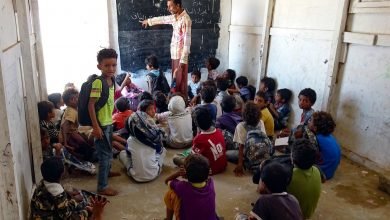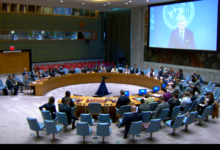Yemen condemns international donor funding shortfall as UK cuts aid

SMA NEWS – London
Reducing funding is a death sentence, says UN secretary general António Guterres
Yemenis and aid organisations have condemned a shortfall in international donor funding for Yemen – including the UK government’s decision to cut roughly 50% of its support for humanitarian efforts – as a “death sentence” for people suffering in the country’s civil war.
The UN hoped to raise $3.85bn (£2.76bn) from more than 100 governments and donors at a virtual pledging conference on Monday to avert widespread famine in the world’s worst humanitarian crisis, but received $1.7bn – less than half – in what the UN secretary general described as a “disappointing outcome”. The total raised at last year’s conference fell $1.5bn short of what was sought.
“Millions of Yemeni children, women and men desperately need aid to live. Cutting aid is a death sentence,” António Guterres said in a statement.
The figure pledged was less than the UN received in 2020, when donations were hit by the coronavirus downturn, and $1bn less than what was pledged at the 2019 conference, he added.
The UK, which is intimately involved in Yemen’s conflict as a leading supplier and supporter of the Saudi- and Emirati-led coalition fighting in the war, has come in for particular criticism from aid agencies and political figures for cutting aid while continuing arms sales.
Britain pledged £87m at Monday’s event – 54% of last year’s donation of £160m, and only 40% of the total funding the UK provided in 2020.
A massive famine is creeping into Yemen, we need to stop it devouring a generation
Andrew Mitchell, the former international development secretary, said: “The government had made an unimaginable decision … in the middle of a global pandemic. Britain is the [pen holder] at the UN on Yemen, yet this decision will condemn hundreds of thousands of children to starvation.”
Reports emerged earlier this year that the UK was planning to cut the legally mandated budget of 0.7% of national income on foreign aid projects, a move that diplomats and experts warned would translate into a 50-70% reduction in funding and a “gut punch” for the world’s poorest people.
Mitchell called for the government to bring forward planned Commons votes on the legality of the cuts, predicting that the impact of the Yemen decision would “bring home the reality” of the proposals and that ministers would struggle to force the changes through parliament.
Ministers have acknowledged they must hold a Commons vote for the proposed cut in aid from 0.7% to 0.5% of gross national income to be lawful, although Boris Johnson, is trying to prevent a vote taking place before he hosts the G7 in June.
The Foreign Office said the £87m pledge for Yemen compared with a £164m total promised by the government at the same conference last year, but that through 2020-21 the government provided a higher total of £214m.
The chance that the UK will boost its total pledge this year, however, is less likely owing to the general cuts in UK aid programming. If the £87m is not increased, it would be the lowest annual amount provided since 2015.
War and famine could wipe out the next generation of Yemenis
A Yemeni aid worker coordinating food distribution programmes, who asked the Guardian not to use her name to protect her organisation’s work, said: “It is hard to describe how heartbreaking the situation in Yemen is right now. We have already had aid cuts since the beginning of 2020 which have helped put 16 million people into hunger. That’s half of the whole population. Children are dying every day here. It is not a moral decision to abandon Yemen.”
Yemen’s civil war erupted in 2014 when Houthi rebel forces seized control of the capital, Sana’a, leading the UN-recognised government to flee to neighbouring Saudi Arabia.
A Saudi- and Emirati-led campaign to drive out the Iran-backed Houthis has been heavily criticised for indiscriminate bombing of civilian infrastructure. The coalition blockade of Yemen’s borders has left 80% of the population dependent on aid to survive, and contributed to the hunger crisis as well as the outbreak of cholera and other infectious diseases.
Joe Biden has said the US will end its support for the Saudi offensive – a major foreign policy reset after allegations that Donald Trump turned a blind eye to gross human rights violations committed by the Gulf monarchies in Yemen.
In a marked difference from Trump’s aid cuts, Biden’s administration announced $191m for UN programming in Yemen at Monday’s conference, bringing its total funding for humanitarian projects in the country to $350m for 2021.
The change in position in the US has led to increased scrutiny over the UK’s intended aid cuts and the sale of weapons destined for use in Yemen’s conflict. Britain suspended arms sales to the coalition in response to a court order in 2019, but resumed them last year, authorising the export of almost £1.4bn of weapons to Riyadh in the quarter after sales restarted. Saudi Arabia represents 40% of the volume of UK arms exports between 2010-19.
Laurie Lee, the chief executive of Care International, said: “In the worst humanitarian disaster in the world, [Britain’s reduced pledge] will take lifesaving aid away from a quarter of a million people on the brink of famine. A famine caused by war. A war enabled by UK arms sales.”
Kevin Watkins, the chief executive of Save the Children UK, said: “This is one of the first illustrations of the devastating real-life consequences of the UK’s decision to abandon its commitment to spend 0.7% of GNI [gross national income] on aid, and we hope the government will urgently rethink this move in time to avoid tragic consequences for the world’s most vulnerable children.”
Last year’s UN pledging conference shortfall was caused in large part by cuts in funding from wealthy Gulf nations.
The UK’s 2021 pledge of £87m follows a trend of year-on-year cuts since 2017.
While the new US administration has expressed a strong desire to restart diplomatic efforts to end Yemen’s conflict, both the humanitarian crisis and fighting on the ground have steadily worsened during 2020 and the beginning of 2021.
Marib, an oil-rich central province previously seen as a safe haven for those fleeing fighting in other parts of the country, has faced a brutal Houthi offensive since February.
The Saudi-led coalition has stepped up airstrikes on rebel positions in Houthi strongholds in north Yemen in retaliation.








